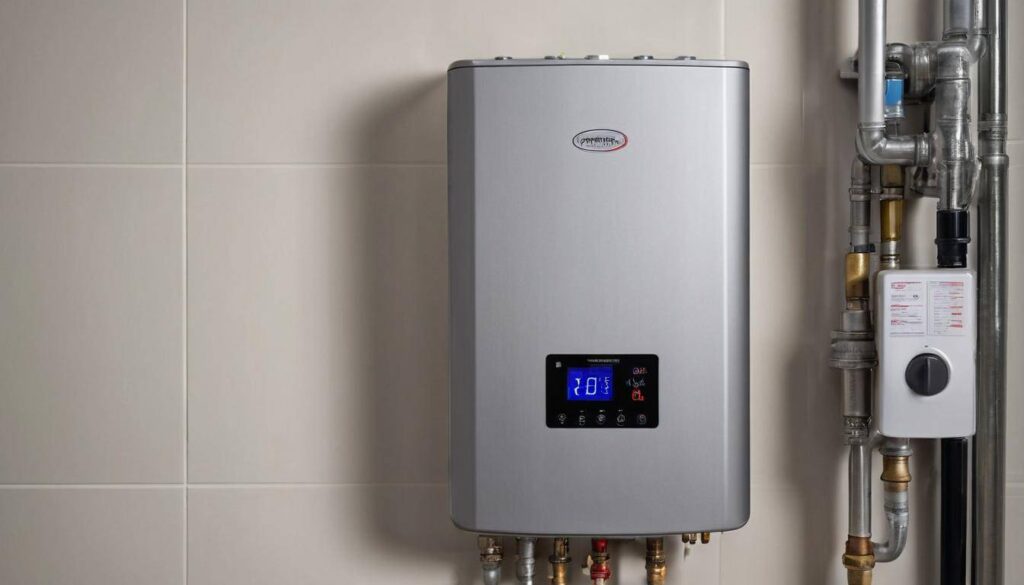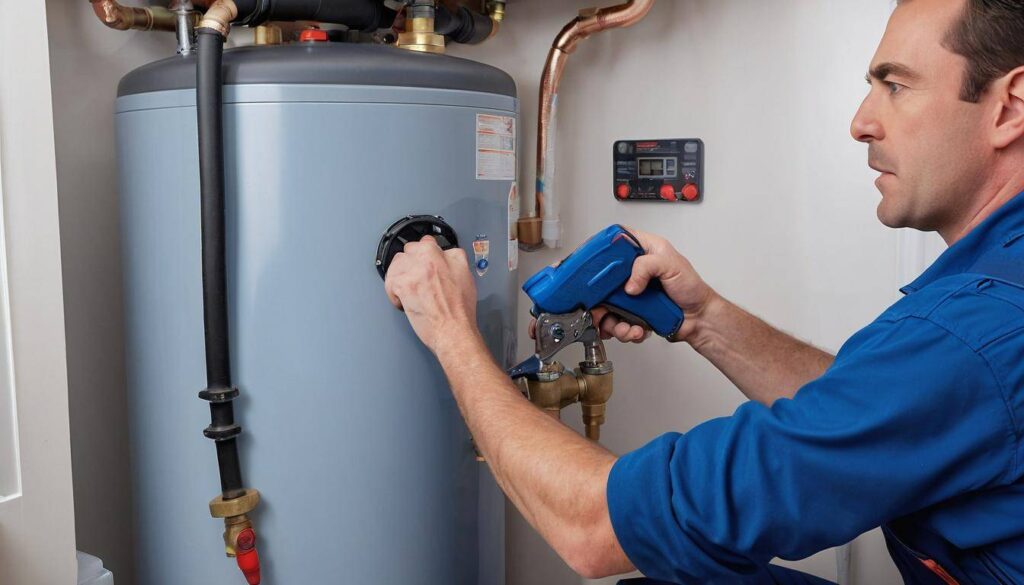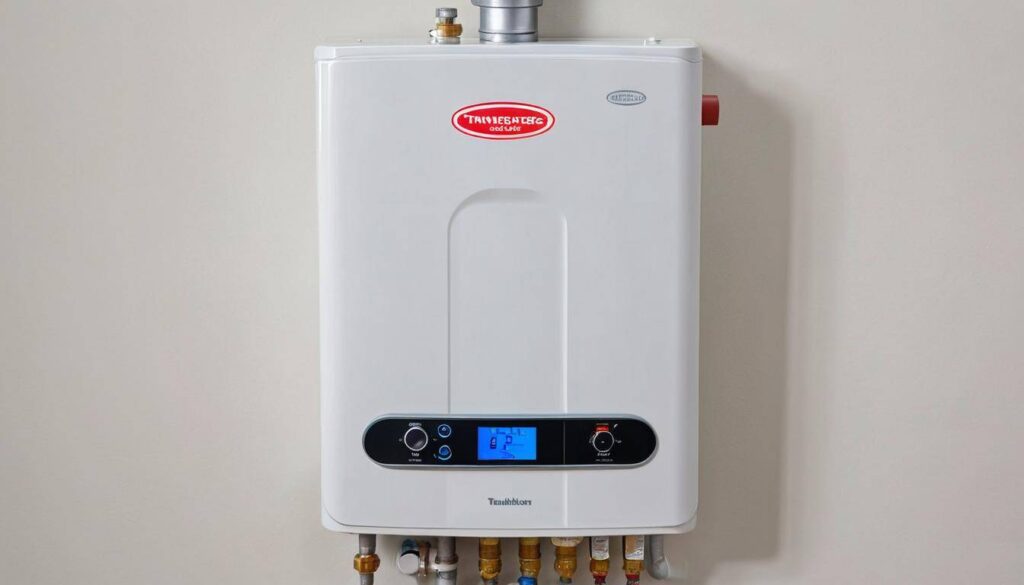Energy Efficiency of Tankless Water Heaters: Savings and Benefits
Tankless water heaters provide superior energy efficiency by warming up water only at the time it’s needed. This on-demand system significantly reduces any energy wastage common in traditional tank models which keep a large amount of water heated continuously. Additionally, these compact units allow homeowners to reclaim valuable space previously occupied by cumbersome tanks. Given their lengthy lifespan of up to 20 years or more with proper maintenance, they represent a cost-effective choice in the long run. So, let’s dive into understanding the world of Tankless Water Heaters.
Tankless water heaters are more energy-efficient than traditional water heaters because they only heat water as needed, eliminating standby energy losses. This means that they can help reduce overall energy consumption and lower utility costs for homeowners.
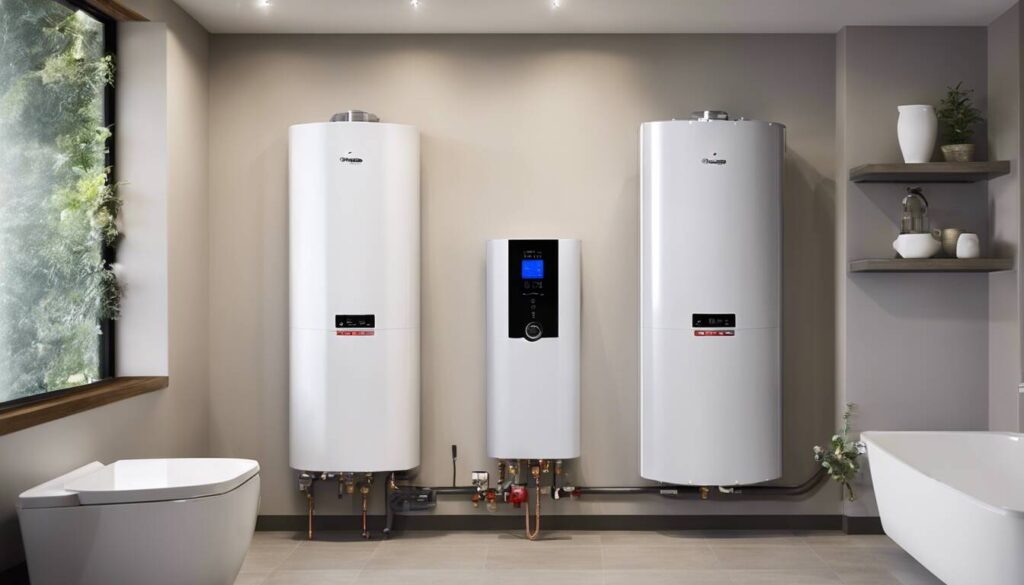
Advantages of Tankless Water Heaters
Tankless water heaters offer a range of benefits that can significantly improve your home’s energy efficiency and daily convenience. Let’s explore these advantages and see how they stack up against traditional tank water heaters.
Continuous Hot Water
One of the most appealing aspects of tankless water heaters is their ability to provide hot water instantly and continuously. Unlike traditional tank water heaters, which can run out of hot water after prolonged use, tankless units heat water on demand. This means you won’t have to wait for a storage tank to refill, ensuring a consistent supply of hot water for as long as you need it. Whether you’re enjoying a long shower or running multiple appliances at once, a tankless system ensures that hot water is always available without interruption.
Energy Efficiency
Tankless water heaters are renowned for their superior energy efficiency. Traditional tank water heaters constantly maintain a large volume of water at the desired temperature, leading to standby energy losses as the stored water gradually cools down and needs reheating. In contrast, tankless units only heat water when it’s needed, eliminating standby energy losses and resulting in significant energy savings over time. By heating water on demand, these systems reduce energy consumption and help lower utility bills, making them an environmentally friendly and cost-effective choice for homeowners.
Space-Saving Design
Another notable advantage of tankless water heaters is their compact and space-saving design. Traditional tank water heaters often require a dedicated storage space, such as a basement or utility room, due to their bulkier size and the need for ample clearance around the unit. In contrast, tankless models are much smaller and can be installed in various locations, including closets, attics, or other tight spaces. This versatility frees up valuable square footage in your home and allows for more flexible installation options, making them ideal for properties with limited space.
Longevity
When it comes to longevity, tankless water heaters outshine traditional tank units with their extended lifespan. With proper maintenance, tankless systems can last 20 years or more, providing reliable hot water for an extended period. This longevity not only reduces the frequency of replacements but also contributes to long-term cost savings and peace of mind for homeowners. The durable construction and efficient operation of tankless units make them a durable investment that offers prolonged performance and reliability.
The advantages of tankless water heaters extend beyond convenience and energy efficiency, offering lasting benefits that enhance your home’s functionality and sustainability.
Traditional Vs. Tankless Water Heaters: An Energy Efficiency Compare
When it comes to energy efficiency, tankless water heaters and traditional ones are as different as night and day. Let’s break it down into the key areas where they differ.
Energy Usage
Tankless Water Heaters: These modern marvels operate on-demand, meaning they only heat water as needed—no more, no less. This smart design cuts down on unnecessary energy consumption by a significant margin. With a tankless system, your home’s water isn’t being heated all day when no one is using it. Think of it like turning off a light when you leave the room—it saves energy and money.
Traditional Water Heaters: In contrast, traditional water heaters are like that car that’s always idling in the driveway. They continuously heat and store large amounts of water in a tank, consuming energy whether you need hot water or not. This results in standby heat loss where the heater constantly needs to reheat the water to maintain the set temperature, which can waste quite a bit of energy over time.
While tankless heaters are designed to be efficient and responsive to your water usage patterns, traditional models use up energy just to keep a huge tank of water toasty around the clock.
Cost Savings
Tankless Water Heaters: As you might expect, lower energy usage translates into cost savings on your utility bills over time. By only heating the water you actually need, a tankless system can lead to long-term financial benefits. It’s like trading in that idling car for a sleek fuel-efficient model.
Traditional Water Heaters: On the other hand, because they’re constantly heating and reheating water in their tanks, traditional water heaters typically come with higher operating costs. The standby heat loss and continuous heating cause them to consume more energy leading to less cost-effective operation compared to their tankless counterparts.
As we’ve seen, the differences between these two types of water heaters are clear—from how they use energy down to what it costs you. Understanding these distinctions will help you make informed decisions about which type of water heater best suits your needs and budget.
Having examined the distinct characteristics of traditional and tankless water heaters, let’s now shift our focus to quantifying the efficiency of tankless water heaters in terms of tangible energy savings.
Energy Savings: Quantifying the Efficiency of Tankless Water Heaters
The potential for energy savings offered by tankless water heaters is significant, especially when considering their impact on homes with varying hot water consumption. According to the U.S. Department of Energy, households using 41 gallons or less of hot water per day can expect a substantial improvement in energy efficiency when using a tankless water heater; they can be 24%-34% more energy-efficient than with a traditional water heater. For homes with greater hot water demands, around 86 gallons per day, the energy efficiency improves by 8%-14% when utilizing a tankless system.
When we break down these percentages, it means that if your home has low hot water usage, switching to a tankless water heater could mean saving nearly a third of the energy used to heat your water. Or even at higher consumption levels, you’re still achieving double-digit percentage savings. These are no small numbers, and when you think about how essential hot water can be for daily life, especially during the colder months, it’s crucial to optimize its usage.
To put this into perspective: imagine what having a quarter to a third of your monthly heating bill cut off would mean for your household’s finances.
For instance, let’s consider the average annual operating cost for both types of systems. The U.S. Department of Energy estimates that a tankless water heater typically costs $100 less to operate each year compared to a traditional storage unit. Over time, these savings accumulate significantly and contribute to lowering overall utility expenses.
Not only does this lead to tangible financial benefits through reduced energy consumption, but it also aligns with sustainable living practices. By conserving energy, homeowners are actively contributing to the reduction of greenhouse gas emissions and environmental impact associated with excessive energy use.
In essence, quantifying the efficiency of tankless water heaters unveils substantial energy savings potential for homes across varying levels of hot water consumption. These savings not only translate into lower utility bills but also embody a commitment to sustainability and reduced environmental impact.
With an understanding of the remarkable energy-saving potential of tankless water heaters, it’s time now to explore their broader environmental impact and ecological contributions in our next section.
The Environmental Impact of Tankless Water Heaters
Tankless water heaters aren’t just beneficial for your utility bills, they also contribute positively to the environment. Let’s explore how they support environmental conservation.
Reduced Greenhouse Gas Emissions One of the most significant advantages of tankless water heaters is their energy efficiency. Unlike traditional water heaters that constantly keep a large tank of water hot, tankless ones only heat water as and when needed. This means they can use up to 30% less energy, leading to a direct reduction in greenhouse gas emissions.
**: “By opting for a tankless water heater in your home, you are actively choosing a more eco-friendly option, reducing the overall carbon footprint associated with heating water.”
Conservation of Resources Using less energy to heat water also has a positive impact on the preservation of natural resources. By conserving energy and reducing consumption, homeowners contribute to global efforts for environmental sustainability. The conventional method of maintaining a large tank of hot water at all times results in unnecessary resource consumption. On the other hand, installing a tankless water heater minimizes this waste by addressing only the demand for hot water as it arises.
In Summary
Tankless water heaters offer a more sustainable approach to heating water. They significantly contribute to environmental conservation by reducing greenhouse gas emissions and conserving natural resources, making them an environmentally responsible choice for homeowners seeking to minimize their ecological impact while enjoying reliable access to hot water.
With an understanding of the environmental benefits of tankless water heaters firmly in place, let’s now shift our focus to the important factors to consider when selecting one of these efficient systems.
Selecting a Tankless Water Heater: Factors to Consider
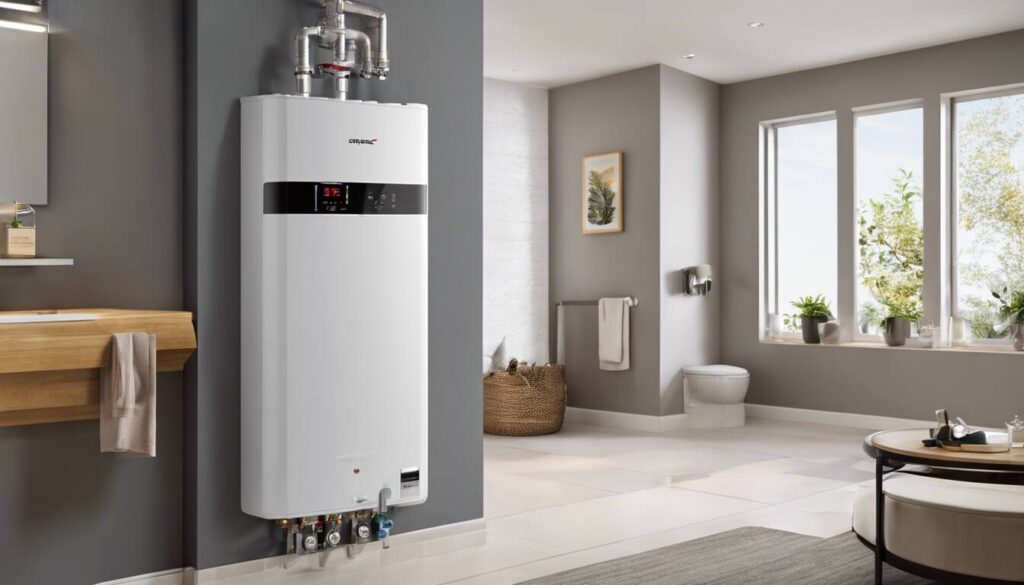
When choosing a tankless water heater for your home, several factors must be carefully considered to ensure optimal performance, energy efficiency, and cost-effectiveness. Let’s break down three crucial factors that will guide you in making the best choice for your household.
Sizing
The size of the unit is crucial when choosing a tankless water heater. It’s directly linked to the hot water demand in your household. If the unit is too small, you might not have enough hot water during peak usage times. Conversely, if it’s too large, you may end up paying more upfront and operating costs may increase unnecessarily. One key aspect to determine is the flow rate, expressed in gallons per minute (GPM), which signifies how much hot water the unit can deliver.
It’s essential to calculate your home’s peak hot water demand based on the number of appliances and fixtures that require hot water simultaneously. For example, while a shower typically uses around 2 GPM and a washing machine about 1.5 GPM, a dishwasher might use 1.5 GPM as well. By adding these up along with any other hot water fixtures used simultaneously in your home, you can estimate your required flow rate and choose a unit that meets this demand without excess.
Fuel Type
Another critical consideration is the type of fuel—electric or gas—that powers the tankless water heater. The availability and cost of energy sources in your area should guide this decision. If natural gas is readily available and affordable, a gas-powered tankless water heater might be the most cost-effective option for you. If natural gas isn’t accessible or if electricity costs are comparatively lower in your region, an electric tankless water heater could be a better fit.
It’s advisable to consult with a professional plumber or heating engineer to evaluate the energy availability and cost comparison between electric and gas installations to make an informed decision.
Energy Efficiency
Opting for an energy-efficient tankless water heater not only reduces your utility bills but also contributes to environmental conservation. Look for models that are ENERGY STAR® certified, ensuring that they meet stringent energy efficiency guidelines set by the Environmental Protection Agency (EPA). ENERGY STAR® certified units consume less energy than conventional models without sacrificing performance.
In addition to ENERGY STAR® certification, consider models with a high Energy Factor (EF) rating, which indicates the overall efficiency of a water heater by measuring how much of the energy gets transformed into hot water. The higher the EF rating, the more efficient the unit.
Considering these crucial factors will help you make an informed decision when selecting a tankless water heater for your home, ensuring it aligns with your specific hot water demands and energy efficiency goals.
These fundamental considerations provide an excellent starting point for choosing an ideal tankless water heater for your home. Now, let’s direct our attention towards understanding the longevity and maintenance aspects associated with these efficient systems.
Longevity and Maintenance of Tankless Water Heaters
Tankless water heaters are a prudent investment for those seeking long-term reliability and efficiency in hot water supply. With proper care, these units can last significantly longer than traditional tank water heaters, sparing homeowners from frequent replacements and ensuring a consistent supply of hot water for many years. The absence of a storage tank means there is less exposure to corrosion, contributing to the extended lifespan of tankless water heaters.
Moreover, the lack of a storage tank reduces the risk of leaks and water damage, which is often a common issue with traditional tank water heaters. However, it’s crucial to remember that regular maintenance plays a crucial role in preserving the longevity and efficient operation of tankless water heaters.
Maintenance Practices
Regular maintenance is key to protecting your investment in a tankless water heater. Descaling and flushing are vital tasks that ensure optimal performance and efficiency over time.
| Maintenance Task | Description |
|---|---|
| Descaling | Removing mineral buildup, such as limescale, from the heat exchanger inside the unit. This process is particularly important in areas with hard water, where mineral deposits can accumulate more quickly. |
| Flushing | Clearing out any sediment or debris that may have entered the unit through the water supply. This helps prevent clogs and maintain the smooth flow of water through the system. |
Both descaling and flushing help prevent clogs and maintain the smooth flow of water through the system. By proactively addressing mineral buildup and debris accumulation, homeowners can avoid potential issues that could compromise the functionality and longevity of their tankless water heater.
Regular Check-ups
In addition to descaling and flushing, routine inspections by qualified technicians can catch potential issues early on, preventing more significant problems down the line. These check-ups provide an opportunity to identify any wear and tear, leaks, or other signs that may indicate the need for adjustments or repairs. Investing in regular professional maintenance can contribute to prolonging the life expectancy of your tankless water heater and keeping it operating at peak efficiency.
Remember, much like any complex system, preventive care is key to ensuring that your tankless water heater continues to function reliably and efficiently over its operational lifespan. By staying ahead of maintenance requirements, you’ll not only extend the longevity of your unit but also enjoy consistent energy savings from its efficient operation.
So, when it comes to ensuring your tankless water heater is a worthwhile addition to your home, regular maintenance is certainly not an area to overlook; rather, it is an essential practice that safeguards your investment while maximizing performance and efficiency.
When it’s about ensuring longevity and efficiency while saving on energy costs with a tankless water heater – investing in regular maintenance elevates your overall experience. To learn more about installation or maintenance services for tankless water heaters in Calgary, Alberta, contact My Calgary Plumber for an estimate at 587 707 0606.

